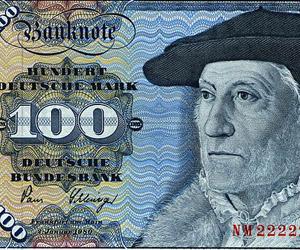New book looks tells fictional tale of post-euro Europe
In Markus Will’s new book, the deutschmark returns to Europe.
In a new German thriller, Germany, sometime in the not-so-distant future, is besieged by an ever-worsening euro crisis.
A new political party has surged into office on a wave of discontent. Their mission — to pull Germany out of the euro zone, bring back the deutschmark and line their own pockets with millions along the way.
It’s pulp fiction, with a dose of prophecy.
It’s called “Die Stunde Des Adlers”, or “The Hour of the Eagle”, and it has everything you’d expect in a thriller: heroes, villains and an opening scene in a top secret bunker, packed with deutschmarks.
But while you’re whipping through the book, author Markus Will, a former financial journalist, also wants to give you an economics lesson.
“I decided to take the layer of a thriller, and entertain people with sex and drugs and rock and roll and combining that part of the plot with my message that we should keep and maintain the euro,” Will said.
Will makes it clear he doesn’t think his scenario is likely — it is a work of fiction. But set aside the sinister elements, Will is aiming to paint what he says is a plausible picture of what might happen if Germany did go back to the deutschmark.
In the book, it doesn’t look good — a more valuable currency would batter Germany’s export-based economy and throw it into a major recession. Germans start bracing for a catastrophic currency change, burying gold in the backyard and buying farmland to provide for themselves in a future where money has lost its value.
It’s enough to make a real-life deutschmark devotee think twice — if the hypothetical future holds up to scrutiny.
Ulrich Blum, a professor of economic policy at Martin Luther University in Halle, hasn’t read Will’s book, though he says he plans to. But Blum says he can’t imagine Germany would leave the euro zone on its own.
“If Germany opts out of the euro area, it will be a northern or a core euro that includes the Nordic countries; the Netherlands, Austria, Belgium, Luxembourg, of course,” Blum said. “The really interesting question is where does France go.”
But if this euro split were to occur — and Blum thinks there’s a small possibility it might — the consequences might look something like the scenario laid out in the novel, he says. A big recession in Germany, a potentially critical situation in countries like Italy or Greece and maybe even secret meetings.
In fact, back when the euro was first introduced, Blum says he even proposed keeping a secret stash of Deutschmarks, as a last resort — just like the one in that opening scene.
“I always said we should put all the old Deutsche mark currency into one of the vaults, the atomic vaults that were no longer needed,” he said. “People didn’t listen to me, but I think it’s still a nice idea to have a bunker where everything can be rushed out within a day.”
In the novel, the Deutschmark Party comes to power partly because the established parties do a bad job of engaging the public in conversation about the euro. That’s what Will says he’s trying to do with his thriller — take a close look at the consequences of an alternative he thinks would be disastrous, bringing back the deutschmark.
“Currently the discussions are all very technical — does Greece need another package of billions of euros — but we are kind of losing that bigger picture on why are we actually doing that,” he said.
Will hopes his thriller creates a scary enough picture to persuade readers to keep the deutschmark’s resurrection in the realm of fiction.
So far it’s earned favourable reviews, especially the exciting conclusion. The biggest complaint might be that it’s too realistic.
As one reviewer put it, all those secret meetings were “a bit too earnest.”
We want to hear your feedback so we can keep improving our website, theworld.org. Please fill out this quick survey and let us know your thoughts (your answers will be anonymous). Thanks for your time!
